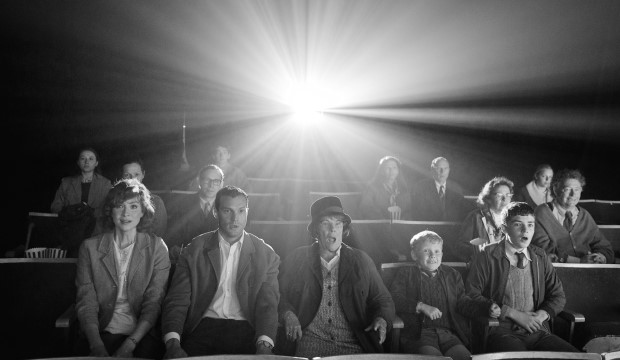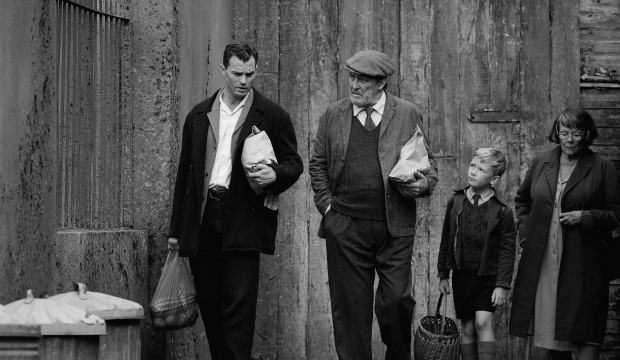Belfast movie review ★★★★★
Kenneth Branagh turns personal for his latest film about the start of the Troubles in Northern Ireland during the 60s. Stars Jamie Dornan, Judi Dench and debut actor Jude Hill
Caitriona Balfe and Jamie Dornan in Belfast (Photo: EPK/Focus Features)
The name gives it away, but writer-director Kenneth Branagh
clearly holds the city of Belfast tight in his soul. As Woody Allen did with
Manhattan and Midnight in Paris, Branagh opens Belfast with a visual tour of the
area: starting at the docks, drifting into the city, before settling in the
working-class neighbourhood where most of his film takes place.
Ascending above a mural on a brick wall, the colour dips into a pristine monochrome. Like Manhattan, Branagh's 1969 memory of Belfast exists only in black-and-white. The silvery sheen lends a pure, nostalgic and cinematic poetry to those Troubled times: as seen through the eyes of nine-year-old Buddy (Jude Hill), based on Branagh’s childhood self.
As those eyes are developing within that neighbourhood, harsh realities are placed in fantastical frames. Buddy plays with a wooden sword and a dustbin-lid shield, then turns and faces a brutal vanguard of anti-Catholic Protestants breaking windows and blowing up cars. He freezes in fear. His Ma (a vivid Caitriona Balfe) eventually picks him up, using the bin lid as a shield against catapulted debris.
The terrors of the Troubles conflate with the escapisms of Star Trek, Chitty Chitty Bang Bang, and old Westerns starring John Wayne and Gary Cooper, which are beamed onto small living-room televisions and large cinema screens.

Left to right: Caitriona Balfe as Ma, Jamie Dornan as Pa, Judi Dench as Granny, Jude Hill as Buddy, and Lewis McAskie as Will. Photo: EPK/Focus Features
Buddy’s Pa (a heroic and loving performance from Jamie Dornan) comes and goes from his job in England, paying the bills. But they’re barely scraping by. And despite being Protestant, Pa is pressured by local anti-Catholic villain Billy Clanton (Benjamin’s Colin Morgan) who darkly struts the streets with his droogs, threatening others to join his cause.
Shot from behind at a low angle, Pa towers like a superhero or a sheriff in the Old West when he calmly says to Billy: ‘You touch my family, and I’ll kill you.’ He has gentle eyes, but you know he means it.
Similar to what Lisa McGee achieves in her Channel 4 comedy Derry Girls, the delightfully amusing experience of Buddy’s coming-of-age stands alongside the violence in his periphery. He deals with the absurdly meritocratic classroom system, falls in love for the first time, and worries about his own morality (prompted by an angry, sweaty, Orson Welles-like preacher).
All while protective DIY barricades border their community, operating like a Checkpoint Charlie for the residents who openly sing and dance nearby. They refuse to live in fear, but that refusal has limits.

Ciarán Hinds as Pop (second from left). Photo: EPK/Focus Features
From the start, Pa drops obvious hints about leaving Belfast but Ma won’t hear of it. The prospect of leaving feels as fanciful as the colours blooming around Raquel Welch’s fur bikini in One Million Years B.C. (the few times colour appears is at the theatre and the cinema). It taps into that fear of alienation after spending generations in a familiar place where everyone understands each other.
Although there aren’t enough portraits of the people living in this community, you feel their warmth. Especially from Pop and Granny (beautifully and hilariously played by Ciarán Hinds and Judi Dench), creatures with infinite love who mind their own business but want what’s best. Despite being perilously disrupted by religious sectarianism, the absurdity of which is never lost on Buddy, the idea of leaving is painful to even consider. Who’d want to leave these neighbours, these family members, behind?
That’s the dilemma you feel as Belfast ends, with Branagh leaving a touching dedication to those citizens. The film is a funny, frightening, charming, and upsetting capsule of that time in that place, filling your heart with Branagh's black-and-white memories.
Belfast will be in UK cinemas on Friday 21 January.
Ascending above a mural on a brick wall, the colour dips into a pristine monochrome. Like Manhattan, Branagh's 1969 memory of Belfast exists only in black-and-white. The silvery sheen lends a pure, nostalgic and cinematic poetry to those Troubled times: as seen through the eyes of nine-year-old Buddy (Jude Hill), based on Branagh’s childhood self.
As those eyes are developing within that neighbourhood, harsh realities are placed in fantastical frames. Buddy plays with a wooden sword and a dustbin-lid shield, then turns and faces a brutal vanguard of anti-Catholic Protestants breaking windows and blowing up cars. He freezes in fear. His Ma (a vivid Caitriona Balfe) eventually picks him up, using the bin lid as a shield against catapulted debris.
The terrors of the Troubles conflate with the escapisms of Star Trek, Chitty Chitty Bang Bang, and old Westerns starring John Wayne and Gary Cooper, which are beamed onto small living-room televisions and large cinema screens.

Left to right: Caitriona Balfe as Ma, Jamie Dornan as Pa, Judi Dench as Granny, Jude Hill as Buddy, and Lewis McAskie as Will. Photo: EPK/Focus Features
Buddy’s Pa (a heroic and loving performance from Jamie Dornan) comes and goes from his job in England, paying the bills. But they’re barely scraping by. And despite being Protestant, Pa is pressured by local anti-Catholic villain Billy Clanton (Benjamin’s Colin Morgan) who darkly struts the streets with his droogs, threatening others to join his cause.
Shot from behind at a low angle, Pa towers like a superhero or a sheriff in the Old West when he calmly says to Billy: ‘You touch my family, and I’ll kill you.’ He has gentle eyes, but you know he means it.
Similar to what Lisa McGee achieves in her Channel 4 comedy Derry Girls, the delightfully amusing experience of Buddy’s coming-of-age stands alongside the violence in his periphery. He deals with the absurdly meritocratic classroom system, falls in love for the first time, and worries about his own morality (prompted by an angry, sweaty, Orson Welles-like preacher).
All while protective DIY barricades border their community, operating like a Checkpoint Charlie for the residents who openly sing and dance nearby. They refuse to live in fear, but that refusal has limits.

Ciarán Hinds as Pop (second from left). Photo: EPK/Focus Features
From the start, Pa drops obvious hints about leaving Belfast but Ma won’t hear of it. The prospect of leaving feels as fanciful as the colours blooming around Raquel Welch’s fur bikini in One Million Years B.C. (the few times colour appears is at the theatre and the cinema). It taps into that fear of alienation after spending generations in a familiar place where everyone understands each other.
Although there aren’t enough portraits of the people living in this community, you feel their warmth. Especially from Pop and Granny (beautifully and hilariously played by Ciarán Hinds and Judi Dench), creatures with infinite love who mind their own business but want what’s best. Despite being perilously disrupted by religious sectarianism, the absurdity of which is never lost on Buddy, the idea of leaving is painful to even consider. Who’d want to leave these neighbours, these family members, behind?
That’s the dilemma you feel as Belfast ends, with Branagh leaving a touching dedication to those citizens. The film is a funny, frightening, charming, and upsetting capsule of that time in that place, filling your heart with Branagh's black-and-white memories.
Belfast will be in UK cinemas on Friday 21 January.
TRY CULTURE WHISPER
Receive free tickets & insider tips to unlock the best of London — direct to your inbox
| What | Belfast movie review |
| When |
21 Jan 22 – 21 Jan 23, IN CINEMAS |
| Price | £n/a |
| Website | Click here for more information |